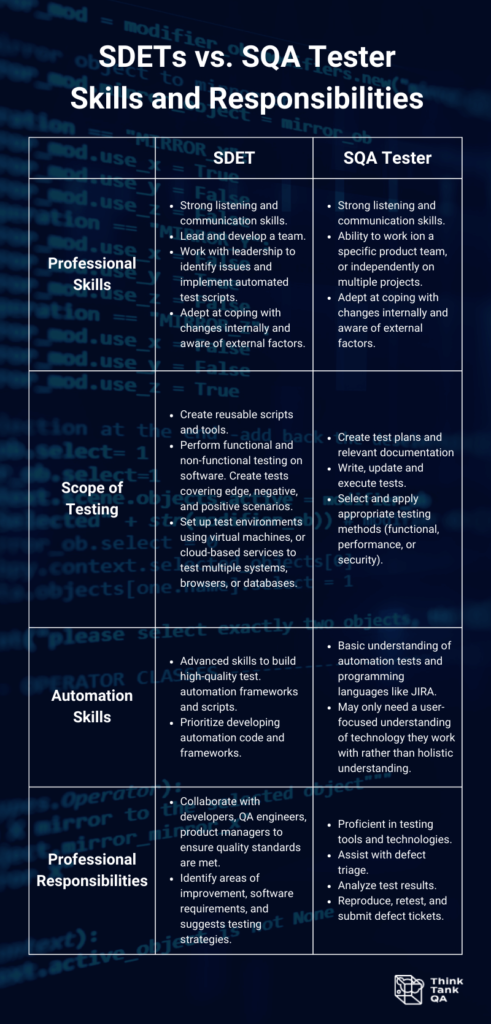Businesses recognize the significance of software testing in guaranteeing that their software applications meet the highest quality standards. However, some companies struggle to decide whether to hire a Software Development Engineer in Test (SDET) or a Software Quality Assurance (SQA) Tester. So, what is SDET, and how does it differ from SQA?
This article discusses the differences between Software Development Engineers in Test vs. Software Quality Assurance Tester to help you understand which role best suits your needs. Understand the SDETs meaning, what they do, and how they differ from SQA. If you are looking to build a testing team, find the information you need regarding the different skills and responsibilities of an SDET engineer and a SQA to enable you to make informed decisions.
- The Difference Between SDET and SQA Testers
- What Is a SDET?
- What Is a SQA Tester?
- Why SDET and SQA Testers Matter

Partner with Think Tank QA for hands-on test design, support, and execution for your next software design project.
The Differences Between SDET vs. SQA
SDET means Software Development Engineer in Test. SDET and SQA Testers play critical roles in ensuring the quality of software applications. However, while their functions may overlap in some areas, there are significant differences in their roles and responsibilities.
Software Quality Assurance Testers are primarily responsible for manual testing of software applications to identify defects and ensure that they meet the required specifications. On the other hand, Software Development Engineers in Test are responsible for writing and integrating test code into the software development process. They combine software developers’ and testers’ skills to design and develop automated testing frameworks and tools that streamline the testing process.
Hiring the wrong type of professional can result in a mismatch in skillsets and decrease the efficiency and productivity of your company. Therefore, understanding the differences between SQAs’ and SDETs’ roles and responsibilities is crucial for companies to determine the best fit for their needs.
There are a few key factors to consider when comparing the two roles:
- Professional Skills: Software Development Engineers in Test as professionals have different responsibilities and requirements from a teamwork and department perspective than SQA Testers. Like SQA Testers, they must have strong listening and communication skills to lead and develop a team and work with leadership, in addition to extensive technical skills. Both must be adept at coping with changes internally and aware of external factors as they execute high-priority tasks.
- Scope of Testing: SQA Testers conduct manual testing, while SDET testing focuses only on automation. Software Development Engineers in Test create automated test code and frameworks that continuously validate software functionality. For example, a Software Quality Assurance Tester can manually test the software by clicking through an application and noting any issues they encounter. At the same time, a Software Development Engineer in Test will write code to automate that process and ensure that the same steps are taken each time.
- Automation Skills: A Software Development Engineer in Test has advanced skills in automated testing, programming, and software development tools. In contrast, an SQA Tester might only need to be familiar with a basic test management tool like JIRA and have a user-focused understanding of the technology they are working with.
- Professional Responsibilities: Software Quality Assurance Testers design test plans and test cases, review and interpret design artifacts and requirements, provide feedback on user workflows, and identify and report bugs. Alternatively, a Software Development Engineer in Test designs and implements automated testing frameworks. SDETs ideally build on the work of the SQA, but they need to be capable of performing those SQA responsibilities in addition to their own. SDETs are often experienced in SQA first, then become proficient in programming languages like Java or Python.
What is a Software Development Engineer in Test?
Software Development Engineers in Test are software engineers or IT professionals who create test frameworks and tools to test them. They understand the software architecture, create test plans, and automate testing processes. With a comprehensive understanding of software development and testing, Software Development Engineers in Test are involved in every aspect of software development.
Software Development Engineers in Test play various roles in the software development lifecycle, including design, development, testing, and deployment. They work on various software applications, from enterprise-level systems to mobile and web-based applications. They can also specialize in a specific niche, such as security or performance testing.
SDET roles include:
- Developing and maintaining testing frameworks.
- Identifying and reporting software bugs.
- Collaborating with developers to debug issues.
- Creating automated test scripts.
Software Development Engineers in Test also ensure software products meet quality standards and may be called up to assure compliance with industry regulations.
Some common challenges they face include managing complex testing environments and keeping up with the latest testing tools and technologies.

Through hiring and training, Think Tank QA can assist in enhancing your team or building one from scratch.
Best Industries for SDET
Software Development Engineers in Test are in high demand across various industries. They possess development and testing skills, enabling them to identify software defects through test frameworks early in the development cycle, improving software quality and performance.
Having a software developer in test on your team can significantly benefit your organization by improving your software development process’s speed, efficiency, and quality.
Some industries you will find a Software Engineer in Test include:
- Technology: Many tech companies, such as Google, Amazon, and Microsoft, employ Software Development Engineers in Test to ensure their software products are high quality. They typically write test plans and cases, automate tests, and perform code reviews to catch bugs and ensure the software performs as expected.
- Healthcare: Software Development Engineers in Test in healthcare typically work on testing electronic health record systems, medical imaging software, and other healthcare applications. They ensure these applications are secure, reliable, and meet industry regulations.
- Finance: Software Development Engineers in Test in finance typically work on testing financial software applications, such as trading platforms, mobile banking apps, and payment systems. They also perform embedded testing on the software embedded in financial hardware devices like the ATM, ensuring they are safe and reliable.
- E–commerce: Software Development Engineers in Test typically work on testing e-commerce platforms, point-of-sale systems, and mobile apps. They ensure these applications are secure and reliable and perform well during peak shopping seasons.
- Gaming: Software Development Engineers in Test can typically test video games across multiple platforms, such as PC, console, and mobile. They ensure that games are functional, perform well, and provide an enjoyable user experience.

Think Tank QA Engineers are ready to help you plan and implement embedded testing.
Responsibilities For Software Engineer Development in Test
Software Development Engineers in Test are responsible for ensuring the quality of software products. They work closely with software developers, quality assurance engineers, and product managers to ensure that software products meet the desired quality standards. Software Development Engineers in Test spend significant time writing and executing automated test cases, reviewing code changes, and troubleshooting defects. They also participate in the design and collaborate with cross-functional teams to identify testing requirements and priorities.
Software Development Engineers in Test typically work in an agile development environment, where they are expected to work closely with the development team and participate in daily stand-ups, planning, and meetings. They also work with quality assurance engineers to develop and execute manual test cases and with product managers to ensure that the software product meets customer requirements. Software Development Engineers in Test can work independently or as part of a team. Depending on the company’s policies, they can also work remotely or in an office setting.
SDET responsibilities are further discussed below:
- Collaborate with Developers and Stakeholders: Software Development Engineers in Test work with developers and stakeholders to ensure successful software development by understanding software requirements, identifying areas for improvement, and suggesting testing strategies. They also communicate with project managers and product owners to ensure the on-time delivery of software that meets their expectations.
- Build High-Quality Test Automation Frameworks and Scripts: Software Development Engineers in Test play a critical role in software testing by building high-quality test automation frameworks and scripts. They have programming expertise and use tools like Selenium WebDriver to create frameworks and scripts to identify and isolate issues in various functional scenarios.
- Create reusable scripts and tools: Software Development Engineers in Test contribute to efficiency and productivity in software testing by creating reusable scripts and tools. These scripts and tools can be used for different testing purposes, including functional and non-functional testing. In addition, they develop custom test reporting tools that generate detailed reports to analyze test data. These reports can include metrics like test coverage, execution time, and test results, which can be used across multiple projects.
- Contribute to functional and non-functional testing: They perform functional and non-functional testing on a software product to ensure it meets quality standards. They create test cases covering edge, negative, and positive scenarios.
- Set Up Test Environments: Software Development Engineers in Test are responsible for setting up test environments, which involve configuring and deploying hardware, software, and network infrastructure to create a controlled testing environment for software. They use virtual machines or cloud-based services to set up a test environment with different operating systems, browsers, and databases to ensure the software is tested in a controlled environment.
- Monitor Software Bugs and Provide Feedback: Software Development Engineers in Test are critical in monitoring software bugs and providing feedback. They monitor software during testing, identify bugs, and report them to developers for correction. They also provide feedback to stakeholders on software quality and suggest areas for improvement.
- Participate in Design and Architecture Planning: Participating in software design and architecture planning is crucial for developing high-quality software. Software Development Engineers in Test work with developers to plan and design software, recognize potential problems and suggest solutions, and provide input on the software’s overall quality.
- Contribute to code reviews and other quality assurance activities: Software Development Engineers in Test ensure code efficiency. They also participate in other quality assurance activities like performance, security, and compliance testing to ensure the software meets quality standards.

Learn when to prioritize automated vs. manual testing with Think Tank QA for your next project.
What is a SQA Tester?
A Quality Assurance Software Tester is responsible for testing computer software or applications for bugs, errors, defects, or any issues that could impact their performance. They work as part of a software development team and utilize manual and automated software testing techniques to perform functional and non-functional testing of software.
The basic responsibility of an SQA Tester is to ensure quality through implementing various testing processes. They have a strong understanding of how to utilize software testing tools, embedded test planning and the test execution processes. They are also familiar with techniques that can include manual black box testing, performance testing, load testing, providing user acceptance testing (UAT) support, and scalability testing.
Software Quality Assurance Testers work in various industries, such as technology, finance, healthcare, and gaming. The job title and responsibilities may differ from one organization to another, but common roles include software tester, quality assurance tester, and software quality engineer.
SQA Testers work with various software applications or specialize in a specific type of software, such as mobile applications or web-based systems.These platforms and devices can include testing multiple web browsers and OS versions on iOS, Android, PC, Mac and more.Their primary responsibility is ensuring the software is functional, user-friendly, and meets the end-users requirements.
SQA Testers often face challenges like navigating complex software systems, detecting and reproducing elusive bugs, and staying up-to-date with the latest testing tools and technologies.
Responsibilities For SQA Tester
Software Quality Assurance Testers play a critical role in the software development lifecycle. Their responsibilities and expectations include, but are not limited to the following:
- Creating test plans and relevant documentation
- Reviewing designs, user stories and requirements
- Writing test cases
- Executing test cases
- Reporting and tracking defects
- Reproducing and retesting defects
- Providing feedback to the project team
Software Quality Assurance Testers must have a strong understanding of the product and user requirements to write and execute effective tests. They should also be proficient in using testing tools and technologies.
A typical day for an SQA Tester involves:
- Writing, updating, and executing tests
- Assisting with defect triage
- Analyzing test results
- Reproducing, retesting and submitting defect tickets.
- Collaborating with developers to resolve issues.

They also participate in team meetings to discuss project progress, provide status updates, and share insights and recommendations. SQA Testers often work collaboratively, interacting with developers, project managers, product owners, and other stakeholders. They may work on a team that tests a specific product or work independently on multiple projects. SQA testers can perform their work both in an office or remote setting, and they use various tools and technologies.
The responsibilities of Software Quality Assurance Testers are further described below.
- Embedded testing and evaluation of software products: An SQA Tester plays a critical role in embedded testing. They work by defining quality standards and requirements, running and analyzing test results and ensuring that the quality of the platform meets all requirements. They can provide assurance to developers that the end users needs will be met by their platform through every stage of use.
- Use of testing methods (functional, performance, security): A tester is responsible for selecting and applying appropriate testing methods to ensure software quality. This includes functional testing to ensure the software meets the expected behavior. It also includes performance testing to ensure the software operates within specified performance requirements, and security testing to ensure the software is secure and protects user data. The tester must also ensure these methods are applied consistently and effectively throughout the software development life cycle.
- Ensuring software meets quality standards: A tester is responsible for ensuring the software product meets the expected quality standards. This involves reviewing the software requirements and creating test cases to validate that the software functions correctly, is user-friendly, and meets the client’s needs.
Why SDETs and SQA Testers are Important in Software Development
When building new software, developing an app, or designing a new program, quality assurance is everyone’s responsibility. SDETs and SQA Testers bring different experience and expertise that benefits software development at every stage from initial findings and ideas to product launch.
Software Development Engineers in Test are important in software development because they help ensure the software is high quality, functions as expected, and ultimately meets user needs. Their skills in programming, testing, and automation lead to increased testing speeds and early defect identification.
When an SQA Tester or SQA Lead is embedded into a project, they are able to provide more focus on finding gaps in requirements and design, assess additional quality assurance risks, and ultimately provide integral recommendations from a UX perspective.
This strategic implementation of both SDET’s and SQA’s can save numerous hours in development. Together they can work through bugs, and reduce additional testing burdens or complications that could have otherwise been avoided. Both professions lead to better project outcomes and save frustrations and money from companies and users.
Skills to Look For in SDETs and SQA Testers
The responsibilities of a Software Development Engineer in Test and a Software Quality Assurance Tester vary depending on the organization’s needs and software development environment. However, balancing both technical and soft skills are essential to the success of the person in each role. Both should be self-motivated, proactive, and results-oriented individuals who can work in a fast-paced, agile environment.
- Open Mind: Openness is a crucial soft skill involving being receptive to new concepts and problem-solving methods. Exploring different testing techniques, new strategies, or alternative solutions from other developers and team members leads to better product development.
- Adaptive: The quality of adaptability should also be present, implying the ability to adjust to varying circumstances and surroundings easily. Technology is continuously evolving and teams need to keep up with industry changes or best practices.
- Exploratory and Curious Mindset: An inquisitive and exploratory mindset is a priceless skill for any team member. Making decisions and considering options with a lens of user behavior in mind while monitoring any potential setbacks can halt any negative outcomes in their tracks.
- Collaboration and Communication: Though there can be extensive independent work being managed, clearly and thoughtfully delivering feedback about project progress, updates, or client needs is necessary for any team member. Having outstanding collaboration and communication abilities are crucial for working efficiently with the development team and other stakeholders.
- Technical Skill: Software Development Engineers in Test and Software Quality Assurance Testers need to be proficient in their respective programming languages, automation and manual testing tools, frameworks, and software development methodologies. Experience in development and analysis for varying architecture structures, integrations, and designs are also needed to be efficient in their roles.
For example, A Software Development Engineer in Test working on a web application needs skills in JavaScript, experience working with automation tools like Selenium WebDriver, and expertise in testing frameworks like Jest. They must also know software architecture and system integration for optimal software performance.
Alternatively, SQA Testers have familiarity with programs such as JIRA or Bugzilla as well as experience with various test case management tools, testing tools like Browserstack, and hands on experience testing across a multitude of devices and platforms, .They may work closely with team members in a Scrum methodology to execute testing.

Find support through every stage of software product design with Think Tank QA.
Let Think Tank QA Supercharge Your SDET and SQA Testing Processes
Software Development Engineer in Test plays an important role in software development. When SQA Testers are brought into development early alongside SDET’s, this combination of talent can change the way businesses design and build software. To ensure the quality of your software and streamline your software testing process, it is necessary to have skilled and professional SDETs and SQA Testers.
At Think Tank QA, we offer various services to help businesses establish an effective and efficient software testing practice. We assist in improving the software testing experience through test design, execution, and documentation. Our additional hiring and training support services can streamline teams and bring in quality techniques for SDET and SQA Testers to elevate your software.
No matter the stage of development, or need of your business, our expertise in software development and network of highly skilled professionals brings quality outcomes to your organization. Contact Think Tank QA today and visit our blog page to learn more about our services.

